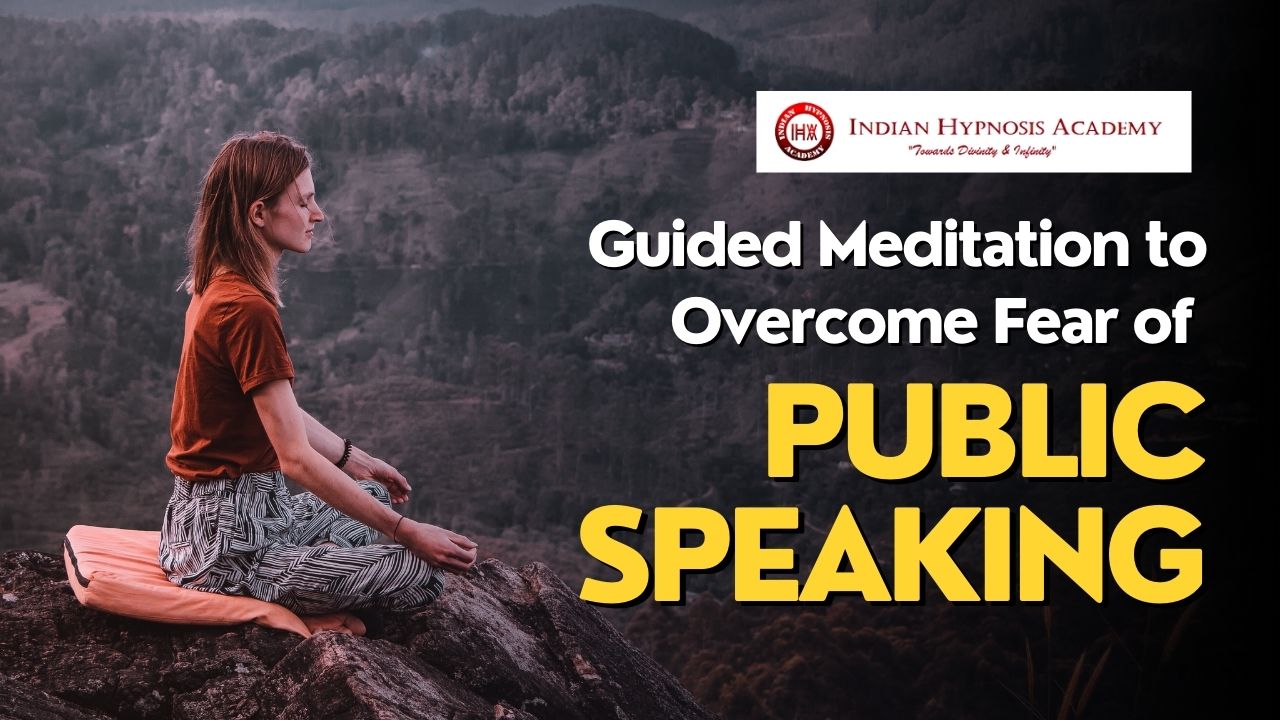Public speaking is a common fear that affects numerous individuals worldwide. The fear of addressing an audience can be overwhelming, leading to anxiety, self-doubt, and even avoidance of public speaking engagements. However, there is a powerful tool that can help conquer this fear: guided meditation. Guided meditation is a practice that combines relaxation techniques, deep breathing exercises, and visualization to calm the mind, reduce anxiety, and instill confidence. In this article, we will explore the benefits of guided meditation in overcoming the fear of public speaking and how it can empower individuals to deliver compelling presentations with poise and confidence.
Understanding the Fear of Public Speaking
Public speaking anxiety, also known as glossophobia, stems from various underlying factors, such as fear of judgment, fear of failure, and self-consciousness. These fears can create a debilitating cycle of negative thoughts and physical symptoms, making it challenging to deliver speeches or presentations effectively. Guided meditation offers a holistic approach to address these fears by targeting both the mind and body.
Relaxation and Mindfulness
One of the primary benefits of guided meditation is its ability to induce deep relaxation and mindfulness. By engaging in guided meditation practices, individuals can enter a state of deep relaxation, releasing tension and calming the nervous system. Through focused attention on the breath and bodily sensations, individuals learn to anchor themselves in the present moment, reducing anxiety and enhancing their ability to stay centered during public speaking engagements.
During guided meditation, individuals are guided to relax their bodies, starting from the top of the head and moving down to the toes. As they consciously release tension from each body part, they experience a profound sense of physical relaxation. This relaxation response counteracts the physiological symptoms of anxiety, such as increased heart rate and shallow breathing, allowing individuals to approach public speaking from a calmer and more composed state.
Furthermore, guided meditation encourages mindfulness, which involves being fully present in the current moment without judgment. By focusing on the present moment rather than anticipating future negative outcomes, individuals can reduce anxiety and alleviate the fear associated with public speaking. This practice also cultivates self-awareness, enabling individuals to recognize their triggers and better manage their responses to stressful situations.
Overcoming Negative Self-Talk
Negative self-talk often intensifies the fear of public speaking. The inner critic may fill the mind with self-doubt, creating a constant stream of negative thoughts and undermining self-confidence. Guided meditation encourages individuals to observe their thoughts without judgment and replace negative self-talk with positive affirmations.
During guided meditation sessions, individuals are guided to cultivate self-compassion and nurture positive beliefs about themselves and their abilities. Affirmations such as “I am confident and capable of delivering an impactful speech” or “I have valuable insights to share with the audience” can help reframe negative thoughts into positive ones. By regularly practicing these affirmations during guided meditation, individuals can gradually replace self-limiting beliefs with empowering and supportive thoughts, boosting their confidence and self-esteem.
Visualization and Mental Rehearsal
Guided meditation incorporates powerful visualization techniques, allowing individuals to mentally rehearse successful speaking engagements. Visualization involves creating vivid mental images of oneself confidently delivering a speech in front of an attentive and supportive audience. This technique helps to reprogram the subconscious mind and create new associations with public speaking.
During guided meditation sessions, individuals are guided to visualize the details of their desired speaking scenario. They imagine the venue, the audience’s positive reactions, and their own confident body language and delivery. By repeatedly visualizing successful outcomes, individuals can build a sense of familiarity and comfort with the experience of public speaking. This mental rehearsal reduces anxiety and increases their preparedness, as their minds become accustomed to positive associations with speaking in public.
Building Confidence and Self-Esteem
Through regular practice, guided meditation helps individuals build confidence and enhance self-esteem. As the fear of public speaking diminishes, individuals become more comfortable expressing their thoughts and ideas in front of others. Guided meditation empowers individuals to recognize their inherent worth and embrace their unique voice, enabling them to connect with their audience on a deeper level.
By engaging in guided meditation, individuals gain a deeper understanding of their strengths, values, and unique perspectives. This self-awareness fosters a sense of authenticity and allows individuals to present themselves genuinely during public speaking engagements. As they become more comfortable with their true selves, their confidence naturally grows, and they develop a genuine belief in their ability to captivate and inspire an audience.
Developing Effective Communication Skills
Guided meditation not only helps overcome the fear of public speaking but also enhances overall communication skills. As individuals become more attuned to their thoughts, emotions, and bodily sensations through mindfulness practices, they develop a greater awareness of their communication patterns. They learn to listen actively, respond consciously, and adapt their delivery to engage their audience effectively. Guided meditation fosters empathy and emotional intelligence, enabling individuals to connect with others in a more meaningful and authentic way.
Through guided meditation, individuals cultivate a deep sense of presence and active listening skills. This allows them to truly connect with their audience, understand their needs and interests, and tailor their message accordingly.
Guided meditation also promotes clarity of thought, helping individuals organize their ideas coherently and communicate them in a concise and engaging manner. By practicing mindfulness and visualization, individuals learn to structure their speeches effectively, convey key messages with impact, and employ storytelling techniques to captivate their audience. These enhanced communication skills contribute to effective public speaking and can be applied across various contexts, benefiting both personal and professional interactions.
Creating a Supportive Mindset
Guided meditation can also help individuals create a supportive mindset towards public speaking. By exploring and addressing any underlying fears or past negative experiences associated with public speaking, individuals can release emotional baggage and create a positive mental framework for future speaking engagements. Guided meditation provides a safe and nurturing space to process emotions, cultivate resilience, and develop a growth mindset, allowing individuals to embrace challenges and view public speaking as an opportunity for personal and professional growth.
During guided meditation sessions, individuals are encouraged to acknowledge and explore any fears or anxieties related to public speaking. By approaching these fears with self-compassion and curiosity, individuals can gain insights into their root causes and develop strategies for managing them. Through visualization and positive affirmations, individuals can rewrite their internal narrative and shift their perspective from fear to excitement. Guided meditation helps individuals develop a growth mindset, recognizing that public speaking is a skill that can be honed and improved over time.
Conclusion
The fear of public speaking can be a significant obstacle in both personal and professional growth. However, with the help of guided meditation, individuals can transform their relationship with public speaking and overcome their fears. By incorporating relaxation, mindfulness, positive affirmations, visualization, mental rehearsal, effective communication strategies, and a supportive mindset, guided meditation offers a comprehensive approach to addressing the underlying anxieties associated with public speaking. Regular practice of guided meditation cultivates a confident mindset, enabling individuals to deliver presentations with poise, authenticity, and impact. Embracing guided meditation as a tool for conquering the fear of public speaking can unlock a world of possibilities, enabling individuals to share their ideas, inspire others, and thrive in their personal and professional endeavors.
Frequently Asked Questions (FAQs)
1. How does guided meditation help in overcoming the fear of public speaking?
Guided meditation combines relaxation techniques, mindfulness practices, visualization, and positive affirmations to calm the mind, reduce anxiety, and build confidence, thereby addressing the underlying fears associated with public speaking.
2. Can guided meditation help with physical symptoms of public speaking anxiety?
Yes, guided meditation induces deep relaxation, which can alleviate physical symptoms such as increased heart rate, sweating, and shallow breathing, helping individuals manage their physical responses to public speaking.
3. How often should I practice guided meditation to overcome my fear of public speaking?
Consistency is key. Regular practice, ideally daily or a few times a week, can gradually rewire your mindset and build resilience against public speaking anxiety. The more you practice, the more effective the results are likely to be.
4. Can guided meditation help me with impromptu speaking or spontaneous situations?
Yes, guided meditation not only prepares you for planned speeches but also helps you cultivate a calm and focused state of mind that can be beneficial when speaking impromptu or in unexpected situations.
5. How long does it take to see the effects of guided meditation on fear of public speaking?
The timeframe can vary depending on the individual. Some may experience noticeable improvements after a few weeks of consistent practice, while others may require more time. Patience and perseverance are essential for long-term results.
6. Can guided meditation improve my overall communication skills?
Yes, guided meditation enhances communication skills by promoting active listening, empathy, and clarity of thought. It helps you become more present, adapt to your audience, and communicate effectively in various personal and professional contexts.
7. Can guided meditation be combined with other techniques or therapies for public speaking anxiety?
Absolutely. Guided meditation can complement other strategies such as cognitive-behavioral therapy (CBT), public speaking courses, or support groups. Integrating multiple approaches can provide a comprehensive and personalized approach to overcoming public speaking fears.
8. Can guided meditation be helpful for experienced speakers who still experience anxiety?
Yes, guided meditation can be beneficial for individuals at all levels of public speaking experience. It helps manage anxiety, refine presentation skills, and deepen the connection with the audience, allowing even experienced speakers to further enhance their performance.
9. Can guided meditation help with overcoming specific fears, such as fear of forgetting the speech or fear of judgment?
Yes, guided meditation can address specific fears by incorporating visualization and positive affirmations. It helps reframe negative associations and build confidence in handling specific challenges, such as memory lapses or concerns about audience judgment.
10. Is guided meditation a long-term solution for fear of public speaking?
Guided meditation provides valuable tools and techniques for managing fear and building confidence. While it can have profound and lasting effects, it is essential to maintain a consistent practice and apply the skills learned in real-life speaking situations to ensure long-term success.



